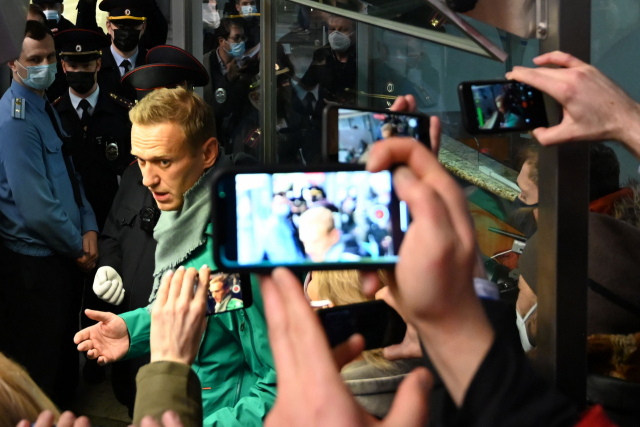‘Putin’ arrested at the’static’ airport returned alive
Reporter Yoon Yeo-jin [email protected]
Input: 2021-01-18 14:07:08Revision: 2021-01-18 18:15:55Posted: 2021-01-18 16:12:25



Alexei Navalni, a Russian opposition leader, who was being treated in Berlin, Germany after being attacked by poison, returned to Korea on the 17th (local time) and stands at the immigration desk at Moscow Sheremetyevo Airport. Navalni got on the plane to his home country about five months after being treated in Germany, but was arrested by Russian police immediately after arriving at the airport. AFP Yonhap News
Alexey Navalni, 44, a Russian opposition activist and “static” of President Vladimir Putin, was arrested as soon as he stepped on his own land again on the 17th (local time). It has been five months since he was transferred to a hospital in Berlin, Germany, and passed the dying.
According to foreign media such as the New York Times that day, Russian correctional authorities, the Federal Enforcement Administration, arrested Navalni at Sheremetyevo International Airport for failing to properly comply with their probation obligations and detained them immediately. Navalni is said to be imprisoned in detention centers until the end of this month, when a trial for conversion of probation is scheduled, but the period of imprisonment may be extended. Navalni said through social media, “Putin was so upset that I survived despite his poisoning attempt, and instructed the Russian Federation to file a lawsuit to change the probation against me to imprisonment.”
Overcoming poisoning and returning home
Russian opposition activist Navalni
Taken from the arrivals hall to the detention center
Worldwide condemnation of “immediate release”
Russian Ministry of Foreign Affairs “Do Not Violate the Sovereignty”
As news of Navalni’s arrest spreads, voices from around the world urge him to release him.
US Secretary of State Mike Pompeo said in a statement today that he called for the immediate and unconditional release of Navalni and that “the Russian government urges all parties and candidates to participate in the election to provide a fair playing field.” Jake Sullivan, who was appointed as the first national security adviser to the next administration by Joe Biden, also tweeted that “the Russian attack on Navalni is not just a violation of human rights, but an insult to the Russian people who want to hear his voice.”
The French Ministry of Foreign Affairs also expressed concern over the news of Navalni’s arrest in a statement released on Twitter that day, and Charles Michel, the executive chairman of the European Union (EU) summit, criticized Navalni’s arrest as “unacceptable.” Polish Prime Minister Matteusi Moravietsky also criticized Facebook as “another attempt to threaten democratic opposition forces in Russia,” and Lithuania’s foreign minister Gabrielius Ransbergis also said that if Navalni is not released, Lithuania, Latvia, It warned that Estonia would ask the EU to impose restrictions on Russia.
The arrest of Navalni will be discussed at the European Parliament, which will open on the 18th, and the diplomatic board, which will be held on the 25th. The possibility of Europe making a joint statement calling for the release of Navalni on the 19th was also raised.
In response, Russian Foreign Ministry spokesman Maria Zakarova refuted, saying, “Respect international law, do not violate the laws of sovereign states and deal with domestic issues.”
On the other hand, a famous blogger and a former lawyer, who is considered a symbol of the anti-corruption movement in Russia, received intensive checks by the regime as a major target of the current ruling forces. In August of last year, he collapsed on a Russian domestic aircraft showing symptoms of poison, and was transferred to Germany for rehabilitation treatment. Western research institutes such as Germany and France pointed to the Russian government behind Navalni’s addiction to the neurological agent nobichok, but Russia denied it.
Reporter Yoon Yeo-jin [email protected]·Some Yonhap News
